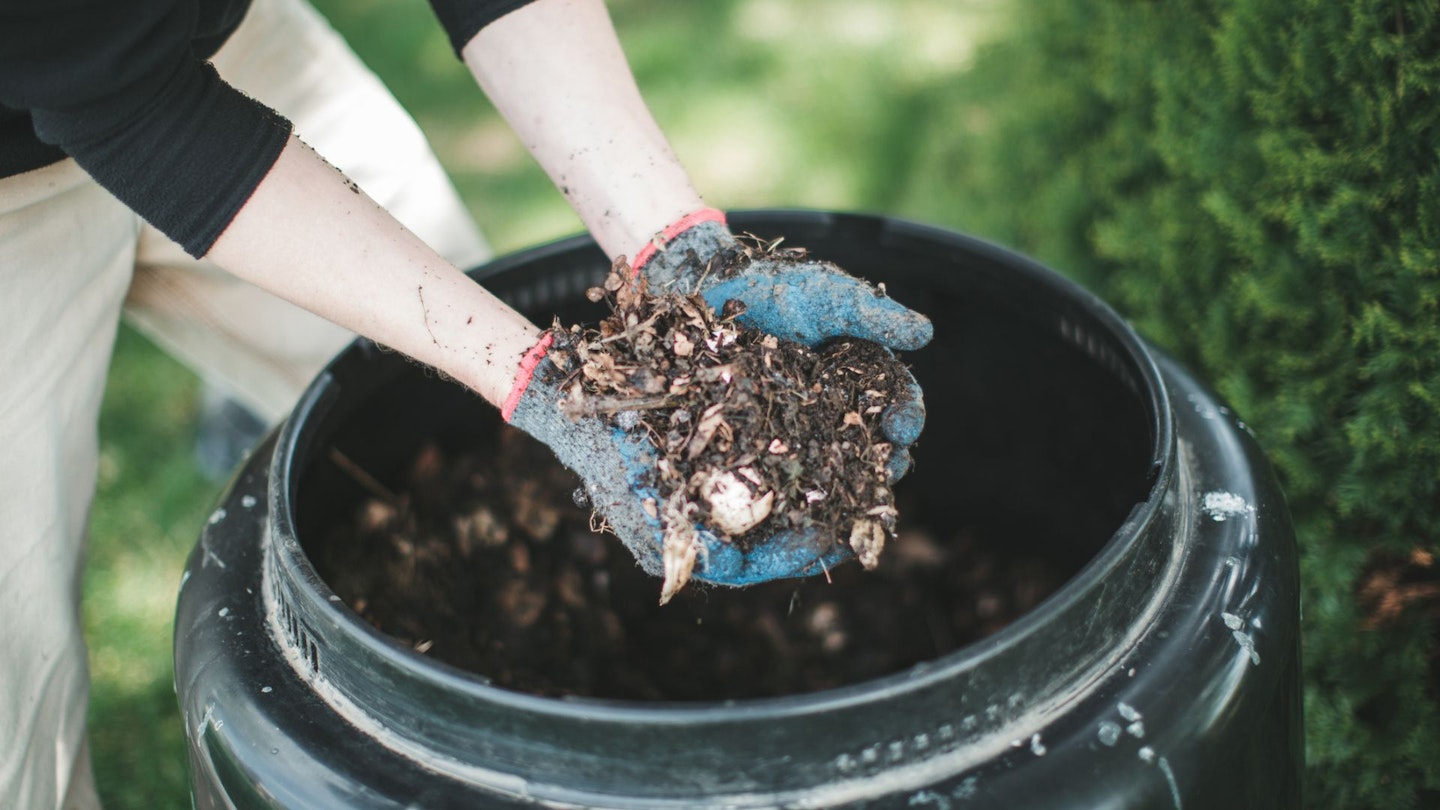Looking for the best compost bin to become even more eco-friendly and give your outdoor plants a health boost? Now – more than ever – gardeners should aim to practise an ecological mindset. Whether that’s with feeding birds in the winter, planting some bee and bug-friendly plants, or recycling in our homes and gardens, it all contributes towards making our planet a better, safer and happier place. Another easy idea to try is to convert your garden and kitchen waste into compost. All you need to get going is one of the best compost bins to keep your garden happy.
Organic matter is actually perfect for your soil and plants. In fact, it provides a decent food source for those little microorganisms that maintain the soil. These little blighters improve the soil’s structure, drainage, water, fertility and capacity to hold nutrients. A decent mulch is vital to the health of soil.
Best compost bins at a glance:
• Best overall compost bin: Blackwall Compost Converter - View now on EvenGreener
• Best wooden compost bin: Forest Slot Down Compost Bin - View now on Amazon UK
• Best hot composter: Green Johanna Hot Composter - View now on Great Green Systems
• Best large plastic compost bin: Garantia Eco-King Composter - View now on Robert Dyas
In this buyer's guide, we've gone through all the different ways you can compost, from traditional wooden bins to hot composters that help decomposition at higher temperatures. See which style would suit you, and your garden, in the carefully curated list below.
The best compost bins for home and garden waste UK
Best wooden
Though able to facilitate aerobic composition well with their ventilation, wooden bins have a few downsides. To prevent any issues, cover the bin with a polythene sheet to keep the heat in - and the rain out. Garden News writer, Geoff Hodge, advises, "Pressure-treated wood will last longer than dipped wood."
Pros of wooden compost bins:
• Slats allow ventilation
Cons of wooden compost bins:
• Doesn't retain heat very well
• Some are open to the rain
Best beehive wooden composter
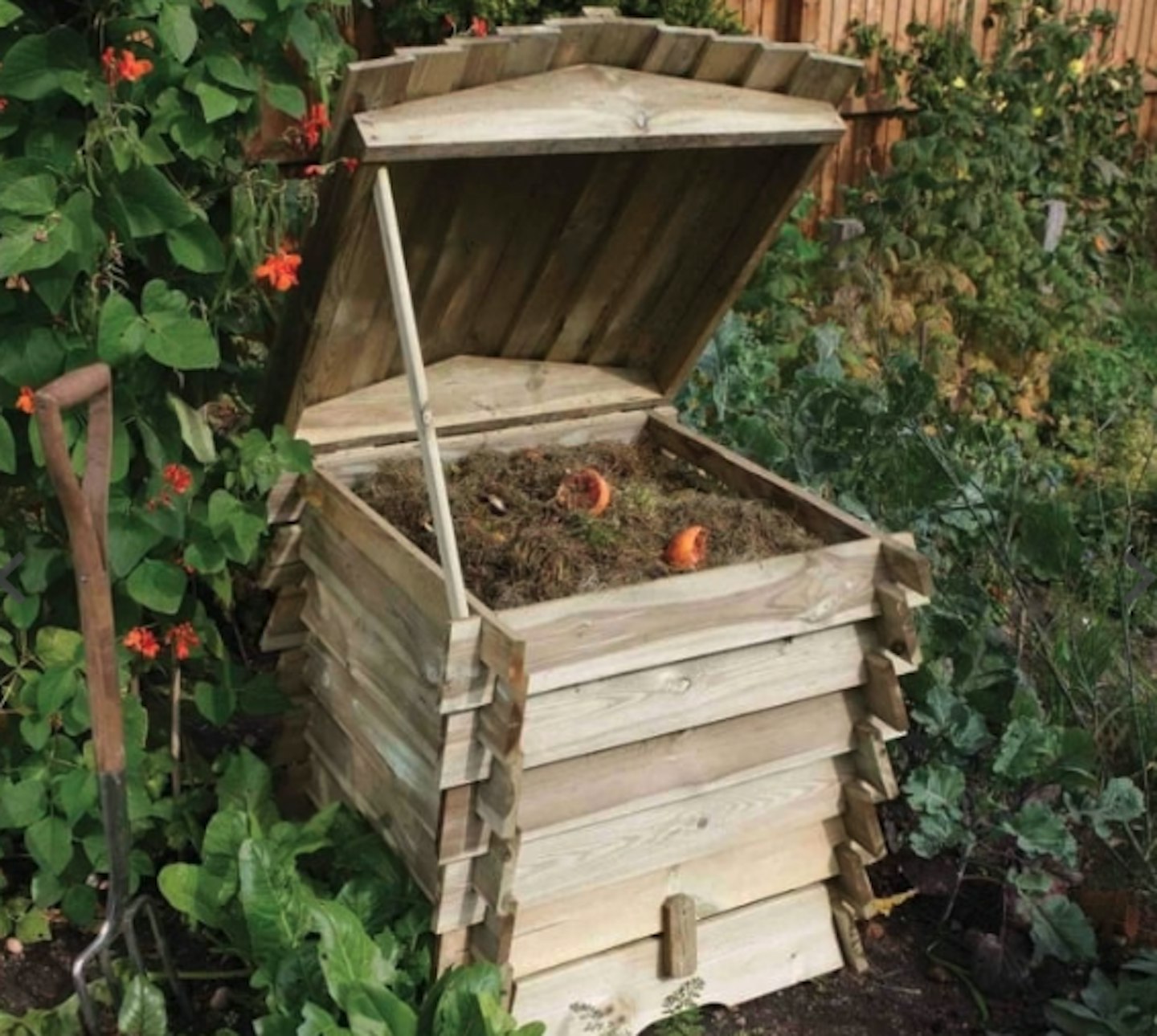 Rowlinson/Robert Dyas
Rowlinson/Robert Dyas www.robertdyas.co.uk
Rowlinson's Beehive Composter is attractively styled to fit into any garden space and can also be used as a planter. This pressure-treated, FSC-certified wood is manufactured from sustainable sources and is ready to ensure durable protection against rot and the UK's weather.
This has a large lifting lid that spans the width of the bin. You can prop the lid open with the included stay to add new material or to ventilate the bin's contents. At the base of the bin is a removable bottom panel for easy access.
Pros
- Pressure-treated wood that's from FSC-certified sources
- Handy removable bottom panel for easy access
Cons
- Some reviewers say assembly is fiddly
| Dimensions: | H80 x W74 x D74 cm |
| Capacity: | 211 Litres |
Best rustic wooden compost bin
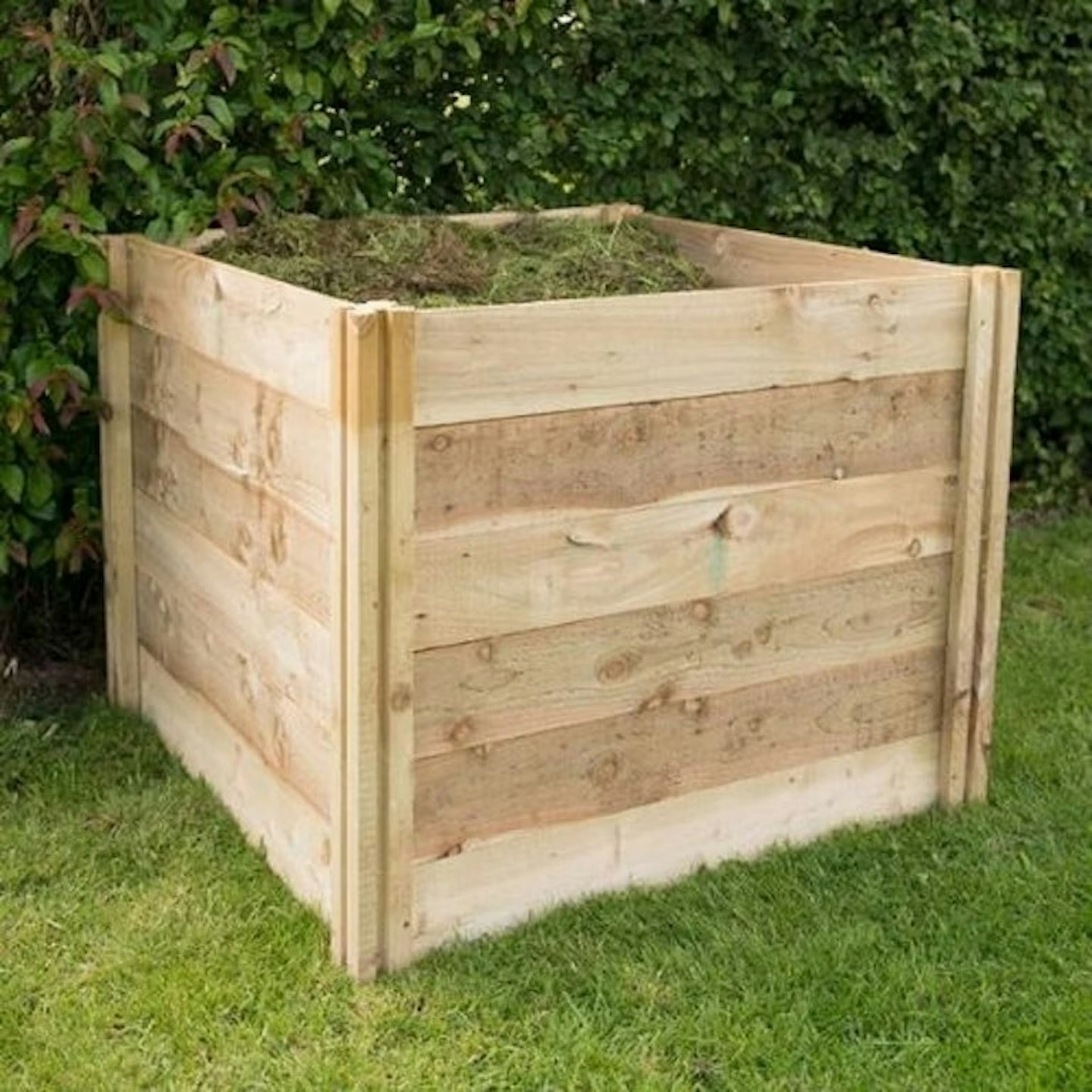 Forest Garden/Amazon
Forest Garden/AmazonIf you are an avid gardener, the large Slot-Down Compost Bin from Forest Garden means you can make use of your kitchen scraps to turn them into rich compost, simply by popping them in the top of the open bin. This is made from FSC-certified timber from sustainable sources.
The slot-down design makes accessing your compost much easier than a regular bin as you can remove the slats to access the bin's contents. This composter holds approximately 650 litres, which is an impressive capacity for keen composters.
Pros
- Comes with a 15-year guarantee against rot and fungal decay
- Generous capacity of 650 litres for large amounts of compost
Cons
- This bin has no lid so you may want to source one
| Dimensions: | H82 x W103 cm |
| Capacity: | 650 Litres |
Best budget wooden compost bin
 Lacewing/Amazon
Lacewing/AmazonA brilliant way to help you turn your household and garden waste into compost, this large, wooden slat composter is a fabulous piece of equipment. Plus, it will blend beautifully into any garden. The slatted design ensures your compost will get plenty of ventilation.
This is one of the largest compost bins we're featuring with a capacity measuring in at a whopping 893 litres. This pressure-treated composter comes in an easy-to-assemble flat pack kit that slots together.
Pros
- Very generous 893-litre capacity for lots of compost
- Pressure-treated and guaranteed against rot for 15 years
Cons
- Large gaps in slats won't stop pests from accessing your compost
| Dimensions: | H70 x W113 cm |
| Capacity: | 862 Litres |
Plastic compost bins
Plastic bins are generally made a little smaller than other compost bins but are well-suited to most households. They have features like a lid and a door at the bottom to remove the finished compost. However, organic matter in plastic bins tends to dry out a little more, so be mindful of that.
Pros of plastic compost bins:
• Lids will retain heat
• Protected from the rain
• Often have a door to remove compost
Cons of plastic compost bins:
• Compost may dry
• On the smaller size
• Door can be small and narrow
Best overall compost bin
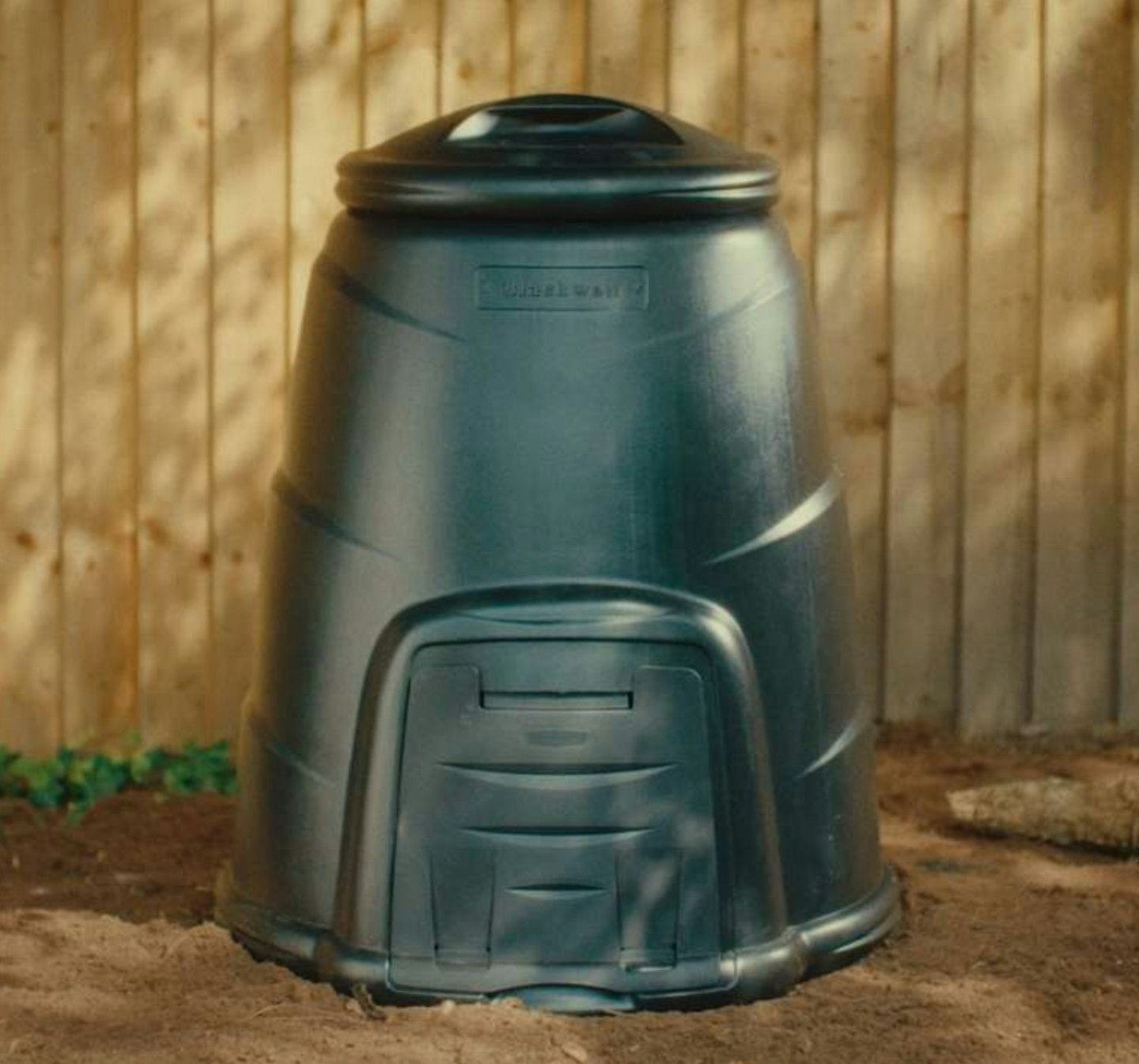 Blackwall
Blackwallevengreener.com
The Blackwall "Compost Converter" comes in two sizes, 330 litres, ideal for the average household, and a more compact 220 litres for those short on space. It is designed to provide a good environment for your compost to thrive in. Like other plastic compost bins, this Blackwall model retains heat to encourage moisture and produce a healthy mixture of microorganisms.
This bin's lid lifts off completely for easy access and there is a handy door at the base of the bin so you can drag out your ripe and ready compost for use. This bin is made in the UK from UV-stabilised, recycled plastic and is also ultimately recyclable.
Pros
- Made in the UK from recycled plastic and is recyclable
- Strong plastic walls and tight-fitting lid means this retains heat well
Cons
- Could dry out compost so will require regular checks
| Dimensions: | H80 cm |
| Capacity: | 330 Litres |
Best large plastic compost bin
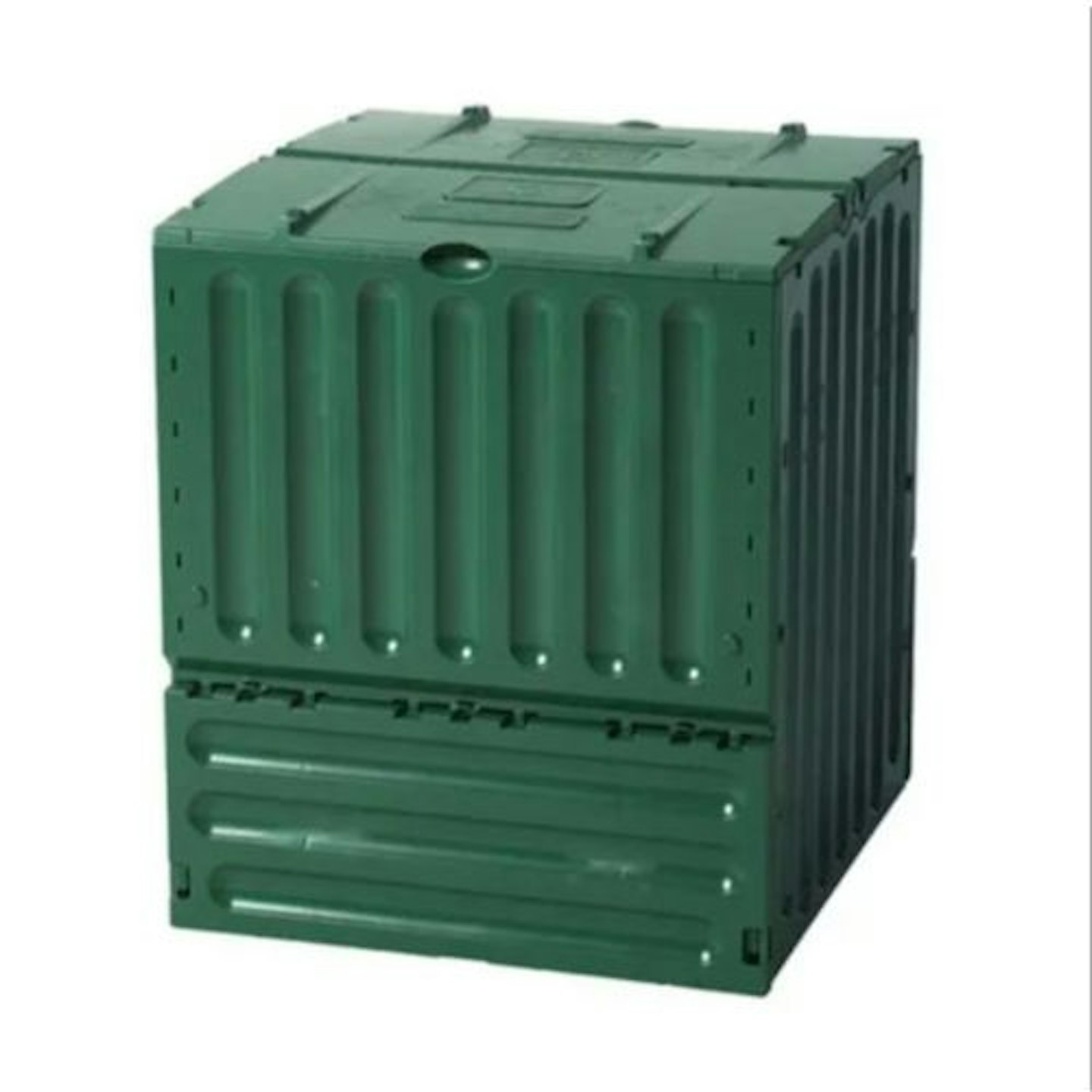 Garantia
Garantiawww.robertdyas.co.uk
The Eco-King Composter, another option made from recycled materials, offers a fast-composting capability and can also be used all year round. Neat and efficient, this composter can easily tackle large quantities with a sizeable 600-litre capacity.
This has two large hatches on the top of the bin to add materials. It requires construction but offers a handy easy locking system so you can assemble it with no sweat and fill it immediately via the hatches.
Pros
- Two large hatches on the top of the bin to add materials
- Green colour will mean this will blend into your garden well
Cons
- Self-assembly required
| Dimensions: | H95 x W80 x D80 cm |
| Capacity: | 600 litres |
Hot Composters
As expected, hot composting is a method of decomposition at higher temperatures, meaning these bins typically are well-designed, better insulated and able to tackle even cooked food. They're generally very robust.
Want more information on hot composting? Keep scrolling for some composting science.
Pros of hot composters:
• Robust and many years of use
• Year-round composting
• Well-insulated and weatherproof
Cons of hot composters:
• Can impact microorganisms
• Time and effort
• Can be a fire hazard
Top hot composter pick
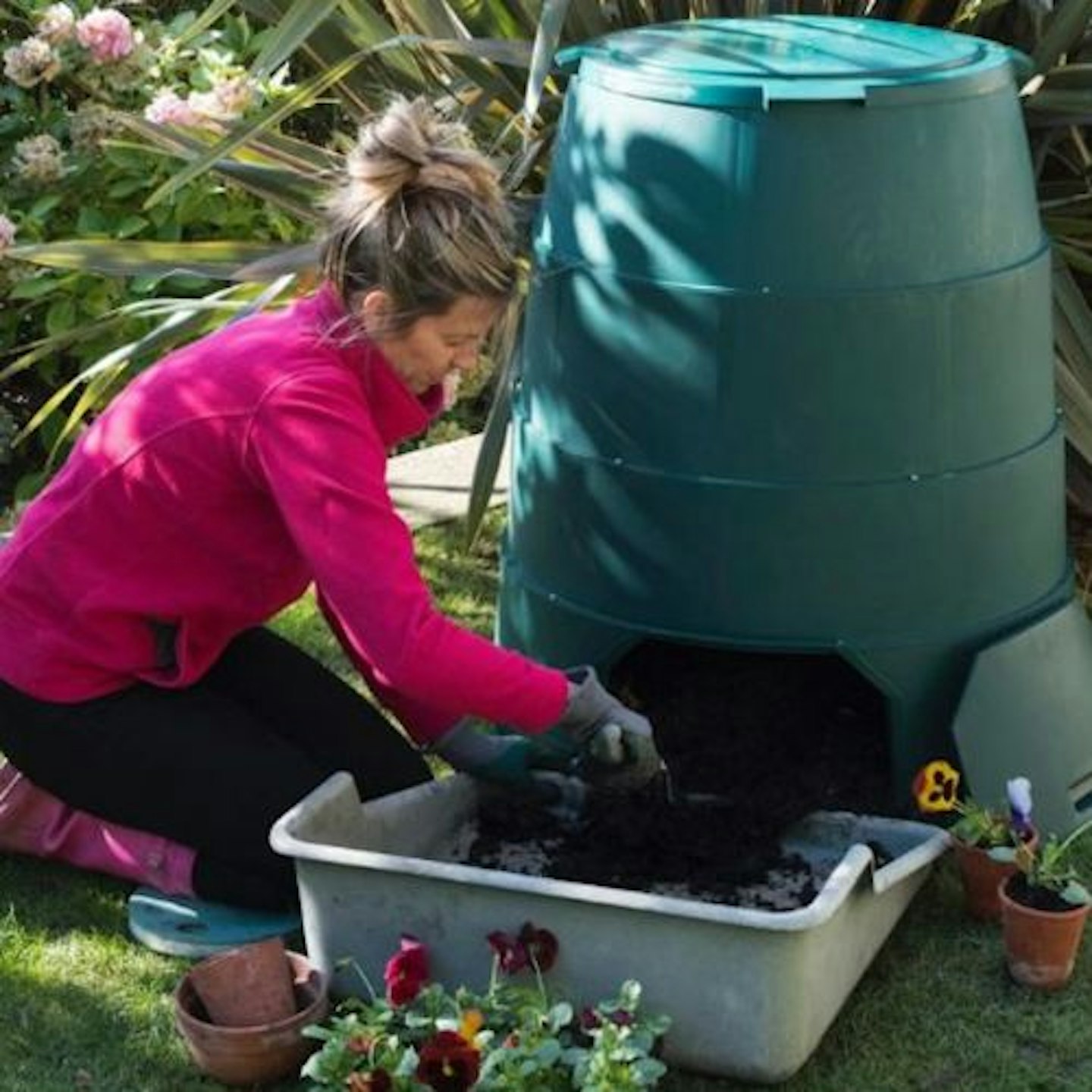 Great Green Systems
Great Green Systems www.greatgreensystems.com
Made from 100% recycled plastic, the Green Johanna is a top-performing hot composter. With an expected lifespan of 10 years or more, this composter turns food waste - including cooked food, meat, fish and dairy - and garden waste into quality compost within months.
With a great patented design to ensure efficient and ventilated composting, this has a robust twistable lid and two sliding hatches that give you access to your compost, but keep it secure until you're ready to use it.
Pros
- Two secure sliding hatches to access your compost
- Patented airflow system enables air to circulate
Cons
- May be too big for some gardens
| Dimensions: | H93 x W80 cm |
| Capacity: | 330 litres |
Best all-round hot compost bin
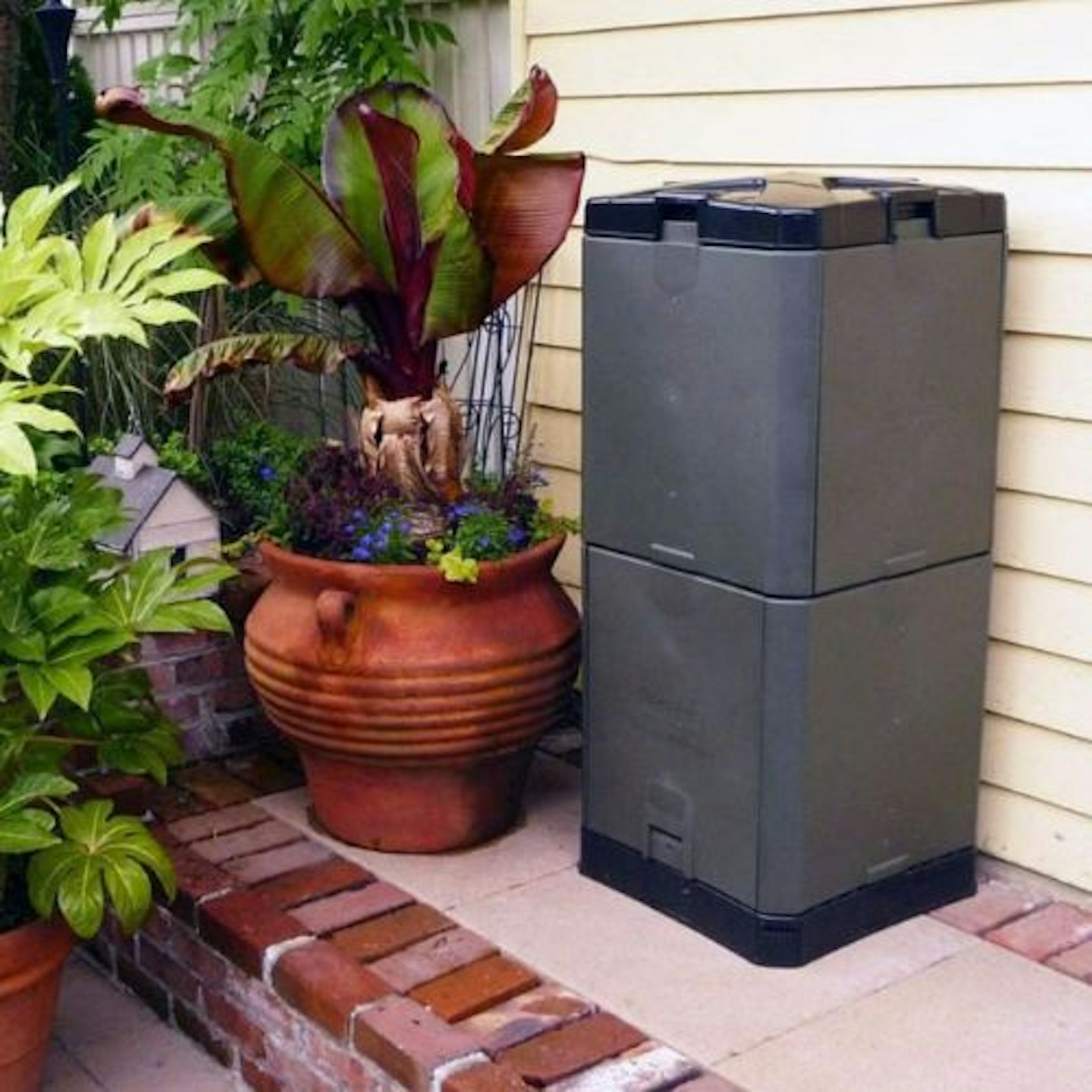 Aerobin
Aerobinwww.originalorganics.co.uk
If you're looking to start hot composting, this is another excellent option as it is very efficient. This composter comes in two boxes, one box for the main component and the second which holds the central aeration lung, or flue. This lung helps with quick breakdown of food and garden waste. We love the addition of the "lung" as it means that there is no need to turn your compost.
With this clever design, and the Aerobin's thick insulation system, you can create the most nutritious compost in as little as 90 days. This comes with a Leachate Hose Extension Kit which makes extracting liquid fertiliser, the "leachate" much easier.
Pros
- Thick insulation for speedy production of compost
- Leachate hose extension kit for extracting liquid fertiliser
Cons
- Smaller capacity than others at just 200 litres
| Dimensions: | H15.9 x W54 x D49 cm |
| Capacity: | 200 litre |
Best small hot compost bin
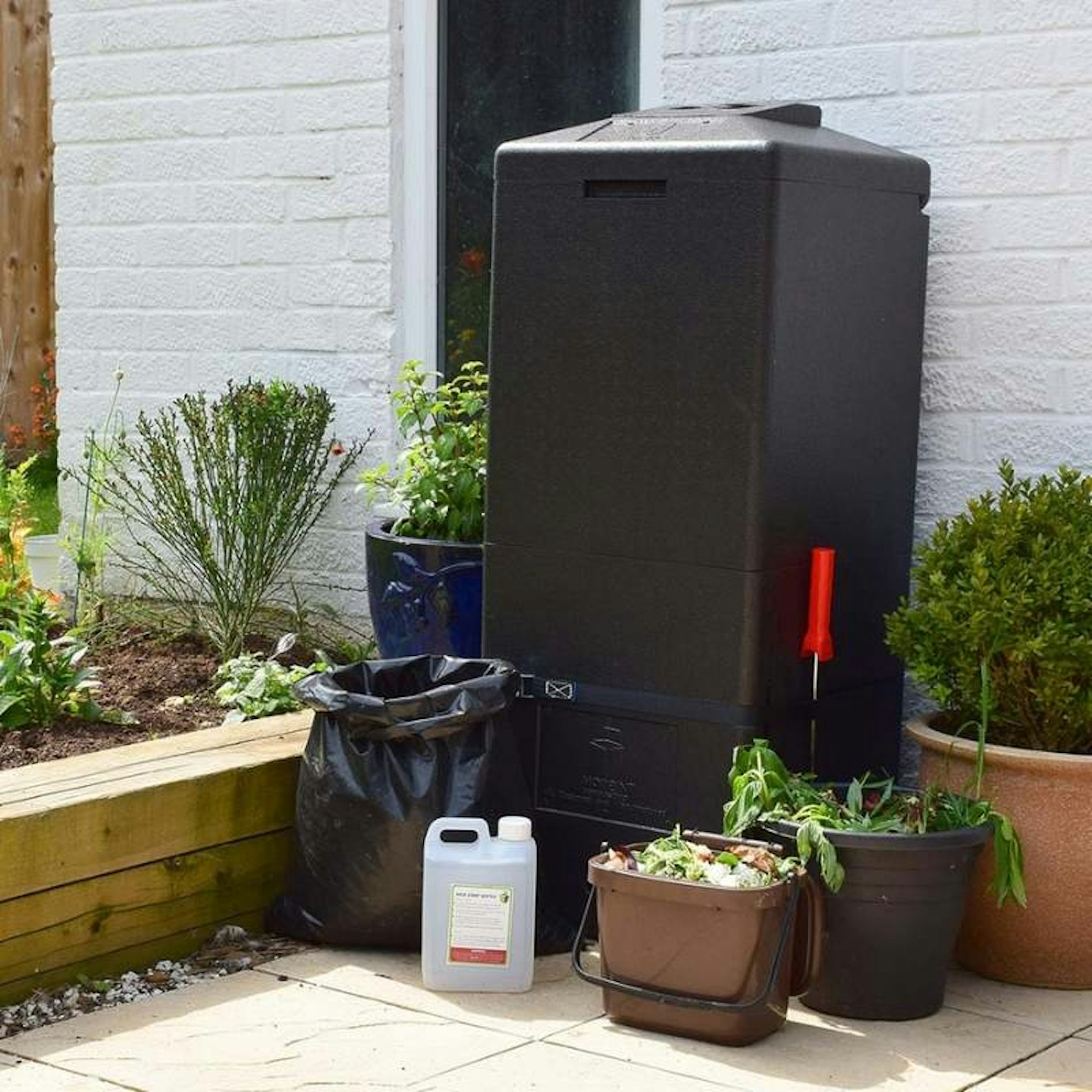 HotBin/Evergreener
HotBin/Evergreener evengreener.com
Sun or shade, the HotBin Mini composts all year round to recycle your house and garden waste. With this bin, composting takes just 90 days, running at 60 degrees. The lid is airtight to reduce smells and keep out vermin.
The aeration valve is there to moderate temperature and the walls are insulated to keep heat in. Plus, there’s an easy-to-remove hatch door to take out mature compost. This makes a great, compact option for smaller outdoor spaces.
Pros
- Has three specialised layers to optimise your composting
- Looks great in even the most space-conscious of gardens
Cons
- Needs to be placed on an even surface
| Dimensions: | H112 x W45 x D45 cm |
| Capacity: | 100 litres |
Bokashi Bins
Bokashi bins are designed for composting animal-based food items and cooked food. Geoff says that bokashi is “not a true composting process, as it uses anaerobic fermentation to ‘pickle’ your waste". However, this method should be regarded as an essential first stage, a pre-compost. Then, it can be either buried in a hole in your garden or popped into a conventional composting bin as we’ve listed so far.
Pros of Bokashi bins:
• Relatively quick
• Can be kept indoors
Cons of Bokashi bins:
• Ongoing costs with bacteria-inoculated bran
• Ideally, you need two bins
Best for sleek and smart design
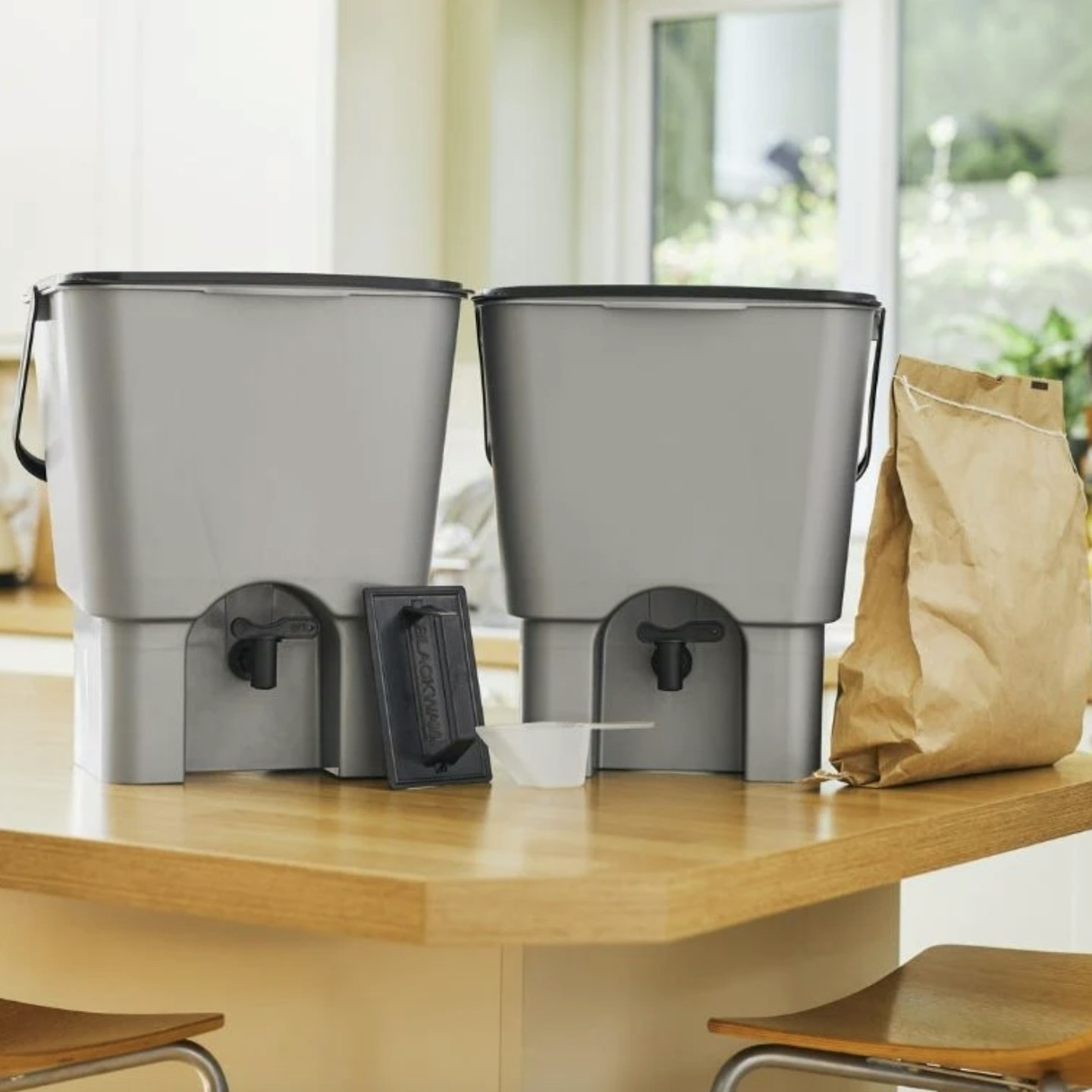 Blackwall/Evergreener
Blackwall/Evergreener evengreener.com
These Bokashi composter bins take all your kitchen waste to produce rich pre-compost, creating micro-organisms to enhance the quality of your garden's soil. It only takes about two weeks to break it down into nutritious, compostable matter.
These bins also produce a microbe-packed liquid fertiliser which can be diluted as a plant feed or poured down your drain to prevent algae build up and odours. Go with this Blackwall twin pack and you will have more than enough pre-compost to rebuild the soil quality in your garden. Plus, this comes with three to four month's supply of the Bokashi bran.
Pros
- Composts all kinds of food scraps so it is incredibly convenient
- It has an air-tight seal to prevent flies or bugs from entering
Cons
- Need to top up the supply of bokashi bran
| Dimensions: | H37 x W32 x D25 cm |
| Capacity: | 18 Litres x 2 |
Best easy to use
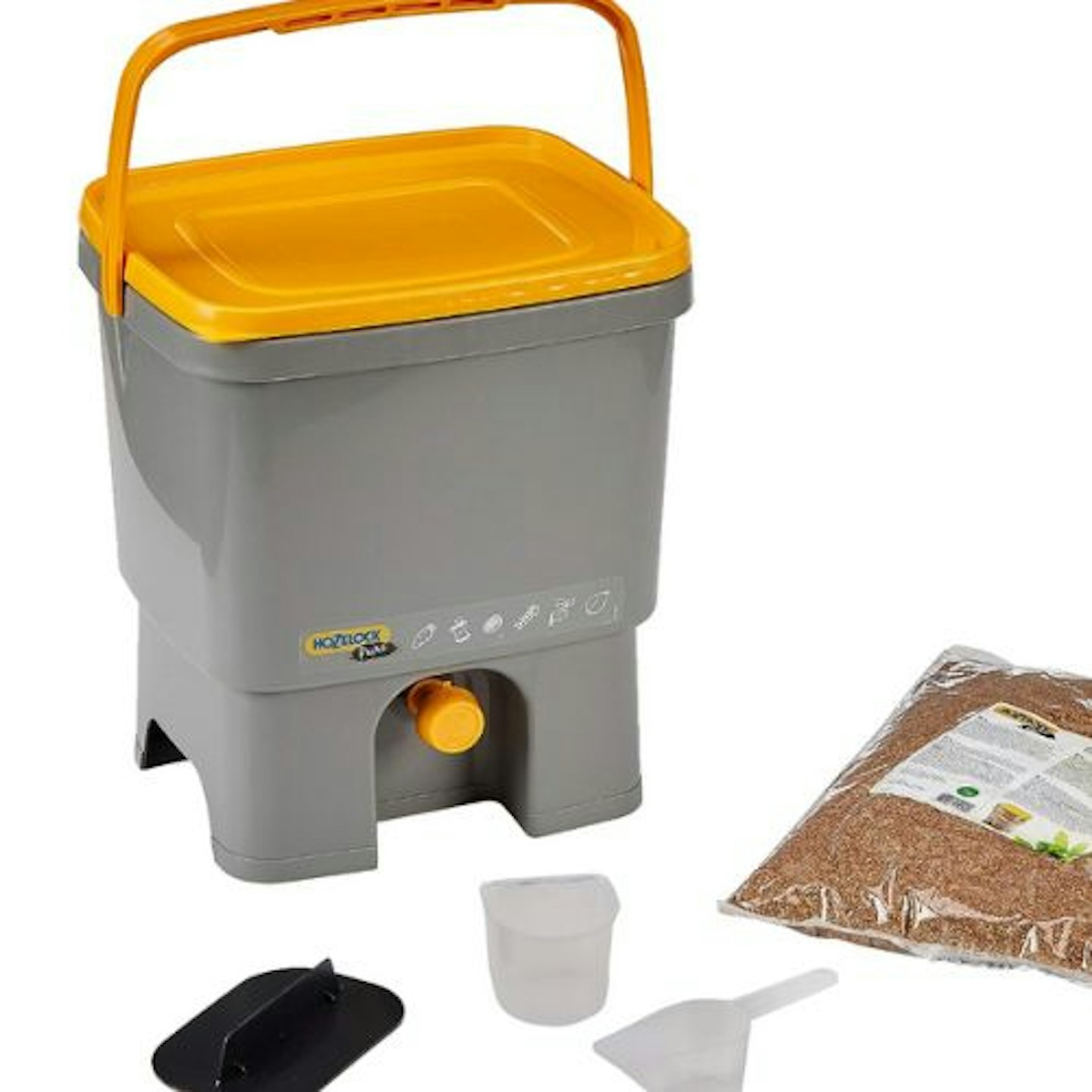 Hozelock/B&Q
Hozelock/B&Qwww.diy.com
Why not opt for this Hozelock Bokashi? With this model, you can transform all kitchen waste into nutrient-rich compost within days. It’s such a simple way to recycle and reduce food waste at home. You can expect liquid fertiliser in less than a week and pre-compost in 20 days.
Like other Bokashis, you can compost meat and fish – with no smell thanks to the bin's robust hermetic seal. Reviewers suggest this compact option is perfect for under your sink.
Pros
- Robust, hermetic airtight seal to stop unpleasant odours
- A compact 16-litre capacity with a small footprint
Cons
- Will need attention a lot due to small size
| Dimensions: | H50 x W50 cm |
| Capacity: | 16 Litres |
How we chose the best compost bins
All of these compost bins have been hand-selected by our team of Modern Gardens shopping experts. We carefully considered the design, materials, and capacity in our selection of the best. Our team has spent hours investigating and researching compost bins to make it easier for you to find the very best, and we'd never recommend a product we don't believe in.
Where possible, we also test and share the latest and best products you should know about. And with help from Modern Gardens Magazine, Garden News and Garden Answers, we share expert gardening knowledge to help you get the most from your product.
Best compost bins FAQs
Why should we compost?
Not only is garden compost good for the soil, but it is also useful for those gardens with light, sandy and heavy, clay soils. Therefore, it makes good mulch when potting and planting out new vegetables and flowers. So, a compost bin keeps all that heat and moisture in for quick, efficient composting.
As Garden News writer, Geoff, says, “Recycling and composting our plant waste is good for us, our gardens and the environment.” We couldn’t agree more. Happy soil, happy plants.
What to look for in a compost bin
We asked Geoff Hodge what he would advise shoppers to look for in a compost bin. We've paraphrased his sage advice:
Capacity - Opt for a compost bin at least 60cm tall, and preferably 90cm, which should offer you around 200-litre and 700-litre capacities. This will hold sufficient material for efficient, fast composting to produce the best results.
Lid - A close fitting lid (that's easy to open and close) helps keep heat in and rainwater out. It can also help contain any of the more unpleasant smells a bin can produce.
Opening - A wide opening makes the bin easier to fill and quicker just to chuck the odd kitchen scraps or organic material in.
Easy access - A good-sized trap door at the base of the bin isn't essential, but it can be difficult to remove the finished compost if the opening is too small.
Open base - It's important to allow access for soil-borne organisms that will enter from the ground below and be beneficial to your compost.
Double up - If you're going to make the most of home composting, you'll need at least two bins, filling one with raw materials while you're emptying the other.
Tool up - Invest a small amount in a compost turner/mixer. These rod-style tools are useful to help turn and aerate compost.
How does hot composting work?
Efficient, hot composting will "break down organic waste far more quickly than a regular compost bin in as little as three months," says Hodge. Clocking in at 50 to 70 degrees Celsius, these higher temperatures will also tackle disease spores and weed seeds. Hot composting really can come in handy.
However, hot composting needs some effort. You can't pop some organic matter into your composter and expect it to work right away. You need to make sure conditions are optimal for hot (and therefore efficient) composting.
You need to have all your materials ready to go in the bin at once - no gradually adding as you go as you would a traditional composter. Breaking down the contents as much as possible is advised, as is regularly turning the compost.
Hodge suggests that "a good ratio of materials, a good amount of moisture, air circulation and a good container that retains the heat" will do the trick. You can crank the heat up by placing the composter in a warmer, sunnier spot in the garden. Though there are some downsides to hot composting, they are very durable and efficient bins to have.
What to read next:
Subscribe to Modern Gardens magazine and get the most out of your outdoor space. Discover everything you need to know to make your outside space look fantastic, quickly and easily, with hundreds of simple ideas, designer tricks, affordable products and expert advice in every issue of Modern Gardens. View our latest subscription offers to save on shop prices.
Piper Huxley is a Homes, Garden and Wellness Product Writer for Modern Gardens Magazine, an all-rounder. When she’s not writing about houseplants, she’s tending to her own growing collection…
